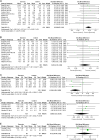Impact of aerobic and resistance training on fatigue, quality of life, and physical activity in prostate cancer patients: a systematic review and meta-analysis
- PMID: 38224407
- PMCID: PMC11487001
- DOI: 10.1097/JS9.0000000000000982
Impact of aerobic and resistance training on fatigue, quality of life, and physical activity in prostate cancer patients: a systematic review and meta-analysis
Abstract
Background: Prostate cancer (PCa) is a prevalent cancer with significant morbidity and mortality rates. In most cases, PCa remains asymptomatic until advanced disease manifests with symptoms, such as benign prostate hyperplasia. Timely detection and better management have improved overall survival in patients with PCa, and fatigue, reduced physical activity, and impaired quality of life (QoL) remain major challenges that impact daily life.
Objective: This study aimed to systematically review and conduct a meta-analysis to evaluate the impact of aerobic and resistance training on fatigue, QoL, and physical activity in PCa patients undergoing treatment.
Material and methods: A comprehensive literature search was conducted using the PubMed, Cochrane Library, and clinicaltrials.gov databases, adhering to the PRISMA guidelines. Twenty studies, involving 1393 participants, were included in the final analysis. The inclusion criteria were studies that evaluated the effects of exercise interventions relative to passive controls in patients with PCa were included. The primary outcomes of interest were fatigue, QoL, and PA. Data from eligible studies were extracted, and a meta-analysis was performed using RevMan 5.40.
Results: Twenty studies met our inclusion criteria. Data analysis of the included studies demonstrated a significant improvement in QoL among PCa patients in the exercise group compared to the control group (SMD=0.20, 95% CI=0.07-0.34, P =0.003). However, there was no significant association between exercise and fatigue (SMD=0.07, 95% CI=-0.13-0.26, P =0.51). Sensitivity analysis did not alter these findings. Regarding physical activity outcomes, the control group exhibited superior performance in the 400 m walk test ( P <0.05). No significant associations were found between exercise and the 6 m walk test or up-and-go time.
Conclusion: This systematic review revealed that aerobic and resistance training enhance the QoL of patients with PCa, although it has a limited impact on fatigue and physical activity levels. These findings advocate a shift in clinical practice and the positioning of exercise as a core component of comprehensive cancer care. Tailoring exercise regimens according to individual patient needs and treatment stages should become the norm in treatment planning. This approach goes beyond physical wellness and addresses the psychological and emotional facets of cancer management. Moreover, there is an evident need for further research to develop holistic exercise interventions that effectively address the complex dynamics of fatigue, physical activity, and QoL in this patient group.
Copyright © 2024 The Author(s). Published by Wolters Kluwer Health, Inc.
Conflict of interest statement
The authors have no relevant financial or non-financial interests to disclose.
Figures
References
-
- Prostate cancer statistics | World Cancer Research Fund International [Internet]. WCRF International. [cited 2023 Jun 18]. https://www.wcrf.org/cancer-trends/prostate-cancer-statistics/
-
- Leslie SW, Soon-Sutton TL, Sajjad RIA, et al. . Prostate Cancer In: StatPearls [Internet]. StatPearls Publishing; 2023. [cited 2023 Jun 18] http://www.ncbi.nlm.nih.gov/books/NBK470550/
-
- Prostate Cancer Stages | Staging of Prostate Cancer [Internet]. [cited 2023 Jun 20]. https://www.cancer.org/cancer/types/prostate-cancer/detection-diagnosis-...
Publication types
MeSH terms
LinkOut - more resources
Full Text Sources
Medical
Miscellaneous




